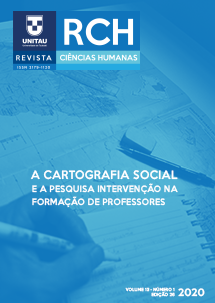QUESTÕES DE GÊNERO NAS PRÁTICAS PEDAGÓGICAS DOS PROFESSORES/AS: DEVIRES CARTOGRÁFICOS
DOI:
https://doi.org/10.32813/2179-1120.2020.v13.n1.a595Abstract
The narratives presented in this article take as central the issues that involve gender, as well as pedagogical practices and teacher training, in an attempt to answer the guiding question: how the demands on gender are present in the school and in what way do these affect pedagogical practices from s professore s /? It includes data from a research carried out by one of the authors, woven collaboratively, linked to the Postgraduate Program in Education and Diversity of a Bahian institution. It is anchored in the qualitative horizon, using the cartographic method as a data construction and analysis procedure, considering the post-critical perspective, of questioning the ways of doing research. From the study carried out and theoretical reflections, it was possible to verify that many teachers still feel hostage to pedagogical practices that are far from the demands of contemporaneous subjects and even if these people are present at school, the environment is still governed by a very hierarchical structure, which insists on looking more at normativity than at diversity.
Metrics
Downloads
Published
How to Cite
Issue
Section
License
Copyright (c) 2020 Human Sciences Journal - RCH

This work is licensed under a Creative Commons Attribution 4.0 International License.
The publications of the Human Sciences Journal are registered under the Creative Commons Attribution CC-BY license.
1. The contents of the manuscripts are the exclusive responsibility of their author.
2. It is allowed the total or partial reproduction of manuscripts published in the journal, provided that the source is cited.
3. When submitting their manuscript to the Journal, the authors certify that they are of their own authorship and unpublished (not published in any digital or printed media).
4. The copyright of the articles published in the Journal are of the author, with first publication rights reserved for this journal.
5. For disclosure purposes, the Journal may replicate the works published in this journal in other media, such as social networks (Facebook, Academia.Edu, etc.).
6. The Journal is of public access, therefore, the authors who submit manuscripts agree that they are of free use.
7. In case of any illegality, fraud, or other attitude that puts in doubt the honesty of the publication, especially the practice of plagiarism, the manuscript will be automatically rejected.
8. If the manuscript has already been published, it will be immediately removed from the base of the Journal, its citation linked to the Journal will be prohibited and the cancellation of the referred publication shall be reported in the next issue of the one in which the article was published. In case of the procedure for the withdrawal of the paper the authors will be informed beforehand, being guaranteed the right to a broad defense.
9. The personal data provided by the authors will be used exclusively for the services provided by this publication and will not be made available for other purposes or to third parties.





